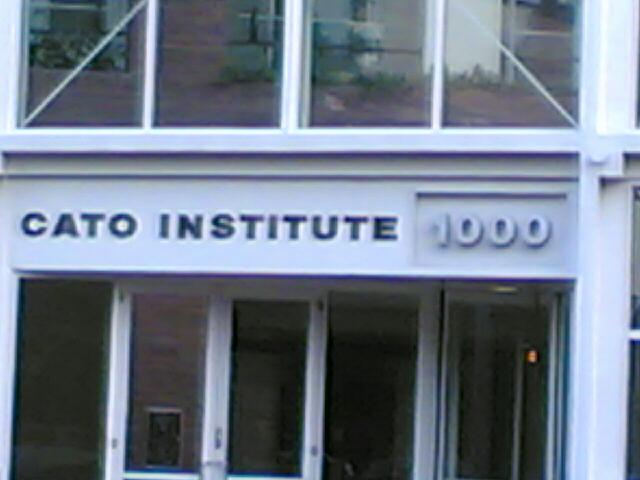
==============================
Hi. For long-term readers of Aleph Blog, when I am at this Conference, there are a lot of posts. If you tire of monetary policy, or my view of it, you can leave me for a day, or, read the summary that I will write this evening.
I got here early for once, taking Google Maps’ pessimistic estimate a little too seriously. ?That said, I ran into more jams going early (6:40-8:10) than when I used to work in DC. ?In a little bit,?James A. Dorn,?Vice President for Monetary Studies at the Cato Institute should open the program. ?When I get spare moments, I will be tweeting at @alephblog. ?You can also watch the hashtag CatoMC16.
(Note: what you will get from me in the next series of posts is basically a series of my notes on what is said at the conference. ?I will highlight my thoughts with “DM”)
(Hey! James Grant just walked next to me. ?I got to greet him.)
James Dorn is introducing the program and other affiliated programs. ?Mentions unconventional monetary policy — low rates, negative rates, big balance sheets for central banks. ?Do financial markets lead the Fed or vice-versa? ?How can markets play a greater role in monetary policy? (DM: perhaps those are opposed to each other.) ? He now introduces:
Thomas M. Hoenig –?Vice Chairman, Federal Deposit Insurance Corporation
Talks about monetary policy and macroprudential supervision. Suggests that policy has been too short-run focused, leading to less stability. ?The dual mandate sometimes leads to short-run behavior, though it does not have to. ?(DM: politics leads that.)
End of Glass-Stegall with lower levels of capital led to the crisis, with Commercial and Investment Banks seeking financial protection amid risky activities. ?Monetary policy was very accommodative leading up to the crisis. ?The system was more sensitive to shocks. ?Central Banks and government pumped in a great deal to stem the crisis. ?(DM: badly targeted)
The Fed and other central banks discovered the asset side of their balance sheets, and began to allocate credit to non-standard assets.
Macroprudential policy is touted as something to undo excesses of monetary policy, but it will not undo inequities stemming from wealth effects.
We now experience low real growth. ?Arguments are coming now to weaken macroprudential policy to goose growth. ?He argues that that would be long-run foolish. ?The system is fragile enough already, so don’t undo what little progress has been made to make things more stable.
(DM: mentions rising interest rates as a threat, but if banks are doing asset-liability management right, that should not be a risk.) ?Argues that rates should rise at a transparent and deliberate rate.
Argues that the industry should pay out less of their earnings, and retain them as working capital, and aid in increase of lending. ?The government safety net should not be an implicit subsidy to big banks. ?Long-term growth will be best achieved with strong banks.
Q&A
Thomas Attaberry FPA Advisors: Nonbanks are providing a lot of finance. ?How do you work with that?
Banks lend to nonbanks. ?We should regulate that lending.
Q2: Different capital for different classes of assets. ?Why can’t we change that?
Not a fan of Risk-based capital. ?(DM: !) Good as internal tools, but not as an external measure. ?Would simply use the leverage ratio.
Victoria Guido, Politico: How does the election change your view/practice of regulations?
He’s going to follow the law. ?It’s all he can do.
Guy at US Bureau Labor Statistics: What do you mean about labor normalizing?
Not sure what the guy is talking about. Finds it difficult to believe that zero interest rates for 8 years is normal. ?Misallocation of capital. ?Look at long term history — eventually move to a policy that reflects that. ?Will not be simple to undo zero rates. ?Quick? Slow?
Walker Todd, Middle TN State U: Professors talking about ETF market — isn’t this like CDOs etc. prior to the crisis.
Does not know what to say, will look at it. ?(Lousy question and answer.)
Carl Golvin Fed.info: How can fiat money lead to a stable economy? ?Why can’t we go back to gold/silver — constitutional money?
There are still bank crises under gold standards. ?Supports central banks with greater limits.
Max Gilman U Missouri — Mentions Bagehot and reserves held at bank of England. ?Why doesn’t FDIC set up a safety net for all financial institutions on a risk-based basis?
We get lobbied on all sorts of things. ?We provide capital on a legislated basis. ?Shareholders and bondlholders should absorb loss first and second (DM: good answer).
